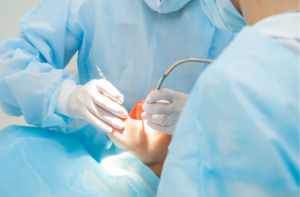 When you need to have oral surgery, you might at first be a little worried or nervous about it. This is a perfectly normal and natural response, and it’s something that everyone will go through as part of the process. But at TriState Dental Care, we pride ourselves on being able to keep all of our patients calm and soothed even while undergoing procedures such as oral surgery. Something that can help here is knowing what to expect before you go, so it might be helpful to take a look at the following description of the procedure and the recovery process.
When you need to have oral surgery, you might at first be a little worried or nervous about it. This is a perfectly normal and natural response, and it’s something that everyone will go through as part of the process. But at TriState Dental Care, we pride ourselves on being able to keep all of our patients calm and soothed even while undergoing procedures such as oral surgery. Something that can help here is knowing what to expect before you go, so it might be helpful to take a look at the following description of the procedure and the recovery process.
Preparation
As with any such procedure, there is always a preparation period. For you that probably means that you will need to look at what medication you are taking, if any, and see whether you can continue to take them or not in the meantime. Your dentist will elucidate all of this for you, so don’t worry about it now. You might also be told not to smoke or drink alcohol 24 hours before the appointment, and you might have to take an antibiotic too. You should also arrange for there to be someone to take you home afterwards.
The Procedure
During the procedure itself, things will unfold depending on the specifics of what surgery you are having done. You might be having a flap surgery, where small cuts in the gums are made in order to clean them out properly. Or you might be having some bone grafting done, which is where lost bone is replaced with a grafted bone made from your own. Alternatively, it might be tissue regeneration, or soft tissue grafts.
Whatever it is, your dentist will proceed slowly and with care, ensuring that each stage is carried out as it needs to be before proceeding to the next.
Recovery
After the surgery, you will have a recovery period. What happens here and how you deal with it are important, as often in recovery you determine how effectively you recover in the long term too. Your recovery depends on the severity of the condition and the surgery itself, and your dentist will be sure to carefully explain to you everything that you need to think about in order to make sure it goes as well as possible.
There will often be minor bleeding or discomfort for a few hours, but you should be able to normally return to normal activities the next day. You might be given a special mouth rinse to keep the mouth clean for a while too. There could also be limitations on what you can eat until you are fully recovered. Again, your dentist will make all of this clear at the time. They might also recommend a follow-up appointment in around two or three weeks, if necessary.
As you can see, the process is easy and simple, and recovery is normally quick, so there is nothing to worry about here. If you have any questions, get in touch today and speak with us.
